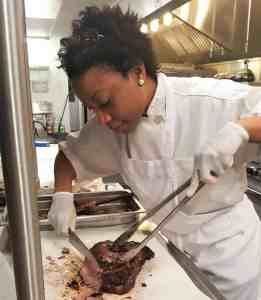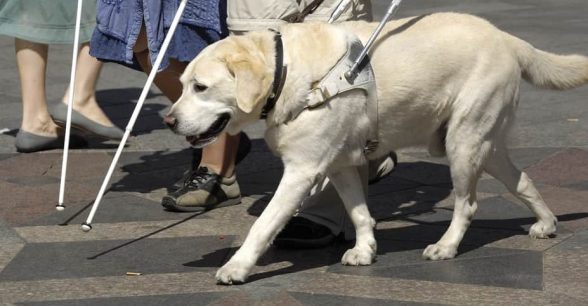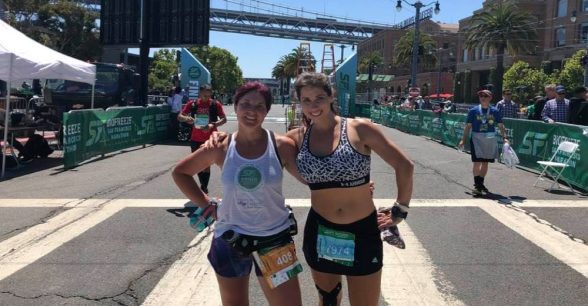Putting Respect on the Menu: On Being a Deaf Chef
Everyone has a gift or a purpose that puts a sparkle in their eyes, quickens their heartbeat a little, and wakes them up more excited to start the morning. We go about our daily activities with varied levels of anticipation and determination to see them through when we have this driving force—knowing we are in the right place, doing the right things for ourselves and our communities.
But as a Deaf chef, others often don’t know quite how to take it when I discuss my Deafness. I do often have to discuss it. One does not “look” Deaf. That is not a thing. I remember when I first landed in kitchen as a prep cook and had to explain.
“But you talk so well!” Really?! Yes, many Deaf people can speak. Some of us use sign language – either American Sign Language or Sign English, and others do not. Many of us do not read lips. I learned how to read lips as a survival mechanism, and it is still stressful.
When I first started, it was not in a back of house kitchen job, but as a front counter cashier. Every day, I had a nervous pit in my stomach, but my supervisors were understanding, customers loved my personality, and I learned that with a set menu, it’s hard to get things wrong. There are a finite number of possibilities to what someone could be asking in a specific environment with a specific agenda every day. I would learn to establish context in whatever professional situation I found myself.
People often neglect to provide communication access, though. I’ve been in kitchens where the chef gave instructions once to the entire group, knowing full well I could not understand what he was saying from my vantage point, leaving me to follow him around like a child until he could be bothered to enunciate what he said in a way that was understandable. Of course, a printed sheet or dry erase board would have been the more accessible way to establish context and handle announcements, major events, or critical instructions—for everyone, really.

Conversely, I have had chefs who wanted to literally hold my hand crossing the street, as if I couldn’t care for my own basic needs as a mature grown woman! I cannot count the number of times I was passed over for advancement, because of lack of properly valuing my contributions, not being informed that I was eligible for it, or that staff was being groomed for it, or not picking up on the “chatter” in the workplace. I stayed focused on my work and out of gossip – which was often conducted about me, right in front of me, as if I wouldn’t notice. Or perhaps hoping I would – with a hostile grin. I kept moving anyway.
Rare was the kitchen leader who was both balanced and secure enough in leadership to provide support without ableism issues. It is never our responsibility to teach others how to behave, or educate others on the best ways to handle this person or that. If someone is subject to our leadership, it is our responsibility to learn the best way to engage and respect that person. Nevertheless, this was the role I assumed—my own personal leadership.
I learned to become my own best advocate—to build bridges instead of hiding behind walls, to be immensely agile, to set and maintain the standard by which people treated me. This is the crux of my success as a person—not fearlessness, but confronting fears many, many times a day.
But my experience is more about being a chef who is Deaf than a Deaf person who cooks. I would be a chef and hospitality director whether I was Deaf or not. This is my calling. It’s important to recognize one’s own gifts and continue on the journey to develop those gifts in a way that honors them properly. It’s equally important to provide access for each person’s success. My Deafness has enriched my life experience, and hopefully my work as a chef has made people I’ve worked with a little bit more aware that diversity adds value to all conversations, regardless of how we conduct them.
About Rooted In Rights
Rooted in Rights exists to amplify the perspectives of the disability community. Blog posts and storyteller videos that we publish and content we re-share on social media do not necessarily reflect the opinions or values of Rooted in Rights nor indicate an endorsement of a program or service by Rooted in Rights. We respect and aim to reflect the diversity of opinions and experiences of the disability community. Rooted in Rights seeks to highlight discussions, not direct them. Learn more about Rooted In Rights




WOW!!! Such a thoughtful and generous insight into Chef Patterson’s life. You truly never know what greatness a person is sharing with you. A really uplifting essay.